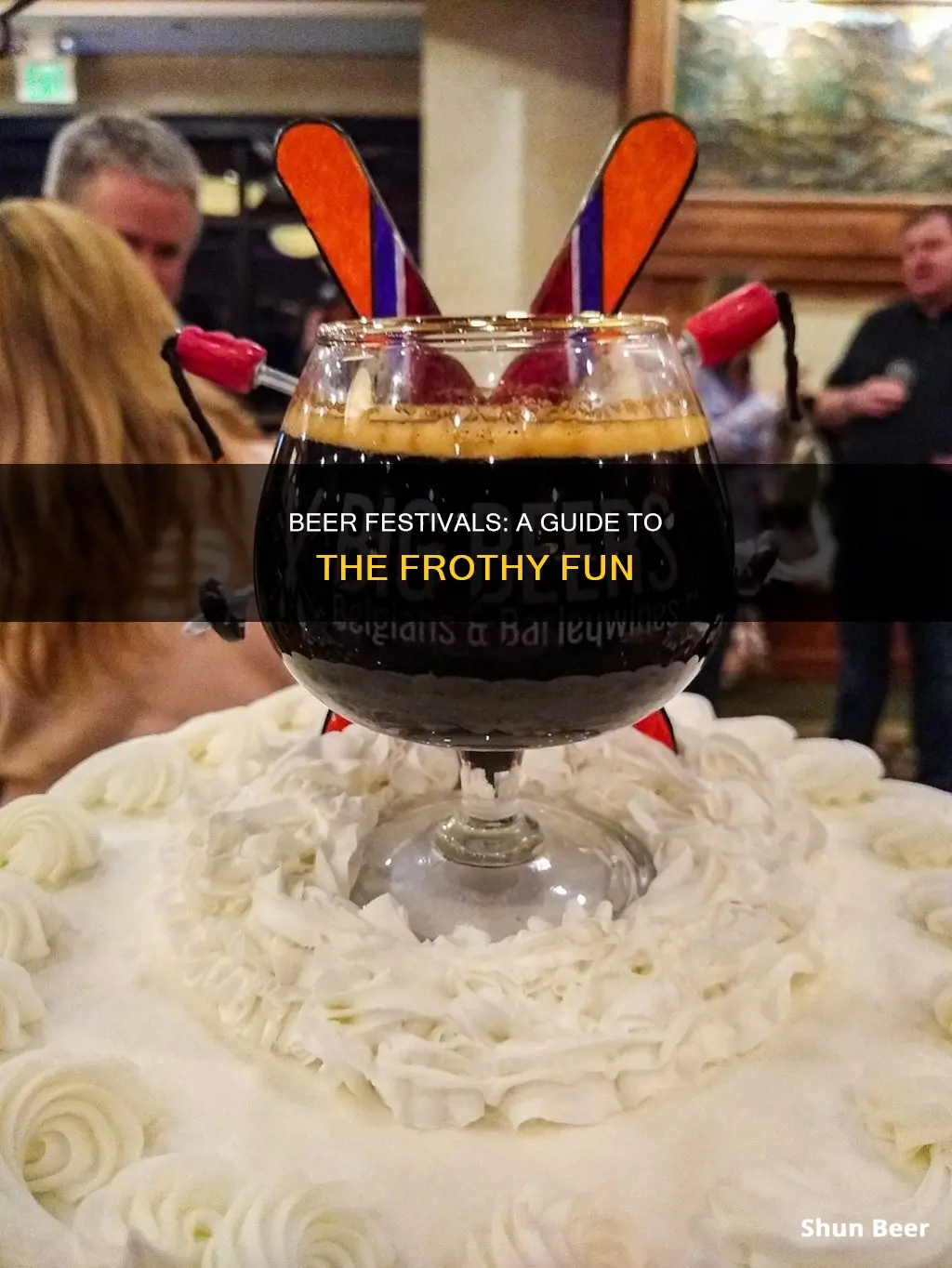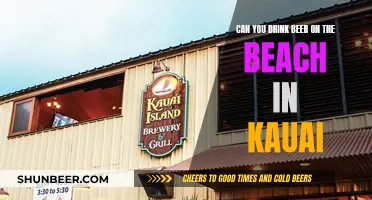
Beer festivals are events where people purchase tickets to drink a variety of beers. They can be themed, hosted by individual breweries, or focused on one particular style of beer. They usually involve brewers pouring their own beer for patrons and can include educational seminars. Planning a beer festival involves choosing a convenient date and location, complying with legal requirements, setting up tasting tents, and promoting the event. It is also important to provide food and water for guests and ensure proper branding and advertising.
| Characteristics | Values |
|---|---|
| Date | Choose a date that is convenient for guests, avoiding holidays or weekdays. Give yourself at least 1-2 months to plan. |
| Location | Choose a venue that matches the festival's vision. Consider the number of guests, vendors, tasting area, food service, etc. |
| Rules and Regulations | Follow all local ordinances and regulations. Obtain any necessary permits for the event, food, and alcohol. |
| Tasting Area | Set up pop-up tents for sampling. These can be themed, e.g. one tent for wheat beers, another for IPAs. |
| Seating Area | Ensure enough seating for guests, especially if there will be food service. Also, consider space for a dance floor, DJ booth, vendors, etc. |
| Brewers | Be inclusive! Invite veteran and newbie brewers, and ensure a variety of brews for guests to sample. |
| Food | Offer food that complements the beers. For light lagers, offer spicy food, burgers, or salads. For IPAs, offer steak, BBQ, or Mexican food. |
| Promotion | Engage local media, social media, and participating brewers to promote the event. Begin promotions at least a few weeks in advance. |
| Tickets | Ticket prices can vary, but expect to pay a premium for sampling from a variety of breweries. |
What You'll Learn

Choosing a date and location
When it comes to location and venue selection, there are several factors to consider. If you're planning an outdoor event, the climate will be a key consideration. In cooler northern climates, an outdoor event during the warmer months is usually preferable. Other factors to think about include the number of guests, whether you'll include food trucks or vendors, and the need for a tasting area.
To make your beer festival unique, look for a space outside typical event venues. Interesting partnerships can help you find a location that will appeal to your audience. For example, you could reach out to local historic sites or organic farmers to see if they can provide a venue. While the location should match the vision for your festival, it's also crucial to consider accessibility, capacity, and parking. Is there access to public transport, or will you need to provide shuttle buses? Is the ground grassy to minimise breakage and slippage if attendees drop their drinks?
It's also important to ensure the venue is large enough to accommodate your expected crowd and meet the needs of attendees and vendors. Partnering with the local municipality can be a great way to secure a public venue and gain access to additional advertising channels and funds.
Fitbit Beers: Compatible with Pixel 2?
You may want to see also

Legalities and permits
Licenses and Permits:
- Consumption on Premises (COP) License: Depending on the location, you may need a COP license, such as 1COP, 2COP, or 4COP, especially if the festival is held in a bar or brewery taproom. If the event extends beyond the licensed premises (e.g., outdoor spaces or parking lots), a temporary extension of the COP license is necessary.
- Caterer License: If the festival involves food sales provided by a licensed caterer, their alcoholic beverage license (13CT license) can serve as the required vendor license. However, the caterer must derive at least 51% of their gross revenue from food service at the festival.
- Special Event License: Charitable organisations, cities, and counties can obtain a short-term special event license for serving alcoholic beverages. If the festival organisers don't have a vendor license or the event is held away from their licensed premises, partnering with a charity or municipality is a common solution.
- City or County Permit: Before obtaining the necessary vendor licenses, organisers often need to obtain permits from the city or county government for the festival's location. Checking with the local zoning and planning office is usually the first step.
- Special Occasion License: In some locations, this license is required for non-profit organisations to sell liquor at a specific time, date, and place. All proceeds from liquor sales must be retained by the non-profit, and there are restrictions on advertising and pricing.
- Banquet Permit: This permit allows the consumption of liquor at private, invitation-only gatherings held in public places or businesses. Liquor must be free or brought by attendees, and the event must not be open to the general public or used for business promotions.
- Temporary Event Permits: Some jurisdictions offer temporary event permits that authorise licensees to sell alcoholic beverages for consumption on property adjacent to their licensed premises for a limited number of days per year.
Distributor Partnerships:
In most cases, beer served at a paid-admission beer festival must go through a licensed distributor. Even when beer is donated by a brewery, a distributor must be involved. Festival organisers can partner with a distributor to receive beer from any licensed production brewery, even those without a local distribution relationship.
Brand Registration:
Before being sold, all beer brands must be registered with the appropriate authorities. While breweries and distributors are primarily responsible for registration, festival organisers should also ensure that only registered brands are served at the event.
Serving Requirements:
In some jurisdictions, such as Florida, all beer at a festival must be poured by employees or volunteers under the control of the organisers or the vendor license holder. This means that individuals listed on a brewery or distributor license may not serve beer at the festival. Additionally, festival organisers should implement measures to prevent the service of alcohol to minors and visibly intoxicated individuals.
Beer Growlers: How Do They Work?
You may want to see also

Tasting tents
Pre-Event Marketing:
Generate buzz and excitement before the event by utilising social media. Create a marketing calendar leading up to the festival, teasing your offerings, such as the types of beers and any snacks, games, or other attractions at your tent. Tag the festival in your posts to encourage organic sharing and build anticipation.
Tent Design and Attractions:
Make your tasting tent memorable with unique lighting, decorations, or branded backdrops. Consider adding countertops, which provide organisational benefits and create a space for attendees to converse about your beer. Offer games or competitions to engage festival-goers and generate word-of-mouth interest. For example, set up a simple carnival game or a basketball hoop, with branded merchandise as prizes.
Water and Snacks:
Provide ample water at your tasting tent, as festival-goers will appreciate a place to hydrate between beer tastings. Customised water bottles with your logo can be a great marketing tool. Additionally, offer simple snacks like chips or pretzels to pair with the beer samples. Ensure that your snacks are Instagram-worthy to encourage social media sharing.
Engage with Neighbours and Attendees:
Chat with attendees and direct them to different options, whether it's recommending neighbouring beer tents or nearby post-festival dining options. Building a friendly and helpful reputation for your brand will leave a positive impression on potential customers.
Post-Event Engagement:
Continue your marketing efforts after the festival by offering post-event discounts to those who visited your tasting tent. This could include beverage promotions or discounts on merchandise, helping to build lasting relationships with customers and maintain the festival's momentum.
Understanding Beer Bikes: How Do They Work?
You may want to see also

Food and drink
It's also important to provide non-alcoholic drinks, such as coffee, tea, and water. Water stations should be set up throughout the venue, and guests should be encouraged to drink water between beer samples.
Some beer festivals offer unlimited food and drink, while others provide a set number of samples per ticket. It's a good idea to communicate this information to guests in advance, so they know what to expect.
If food is available for purchase, it's recommended to offer a variety of options, including food trucks and popular local restaurants. This not only helps to prevent drunkenness but also provides an opportunity to engage with the community.
For those attending a beer festival, it's important to eat a full meal beforehand and to bring snacks or purchase food at the festival. Drinking on an empty stomach can lead to getting drunk quickly, and it's important to pace yourself and stay hydrated throughout the event.
Beer Slug Traps: Do They Work?
You may want to see also

Ticket sales and pricing
When determining ticket pricing, it is beneficial to consult with the brewers, who may have valuable insights from their previous festival experiences. For instance, they can provide guidance on whether to sell tickets at the gate, which may lead to an increase in beer supply. Additionally, discussions with vendors about ticket pricing can help determine whether to charge a flat fee or per sample.
Implementing a token or voucher system for samples can simplify the payment process for beer vendors, allowing them to focus on customer service and pouring drinks. With flexible pricing options, such as offering packages like "3 samples for $X, 6 samples for $XX," etc., you can provide ease and value to attendees while managing traffic flow and enhancing their overall festival experience.
It is also worth noting that some beer festivals offer discounted or free tickets for designated drivers, ensuring that attendees have a safe way to get home.
Beer Bar Memberships: Are They Worth the Cost?
You may want to see also
Frequently asked questions
A beer festival is any event where you purchase a ticket to drink a variety of beers. They can be themed, hosted by individual breweries, or focused on one particular style of beer.
Beer festivals make money through ticket sales, and sometimes through food and merchandise sales.
Here are some tips for first-time attendees:
- Don't feel like you have to finish a beer if you don't like it.
- Drink lots of water and stay hydrated.
- Eat before and during the festival.
- Pace yourself and don't try to drink everything.
- Look at the lineup beforehand and decide which breweries or beers you want to try first.







